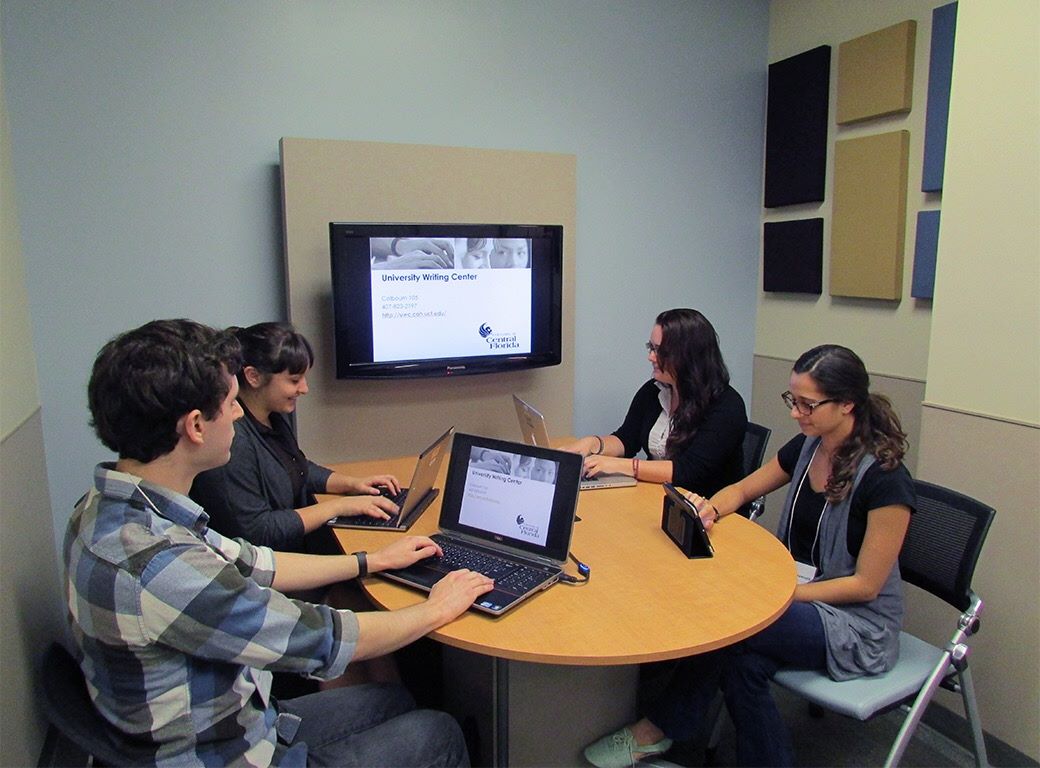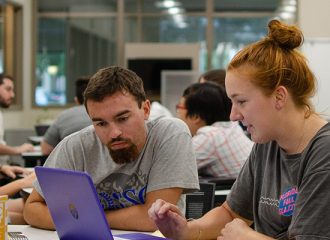by Olivia Sunna
The University Writing Center on the University of Central Florida (UCF) campus offers writing techniques and feedback for all types of writing through writing consultants. These writing consultants, otherwise known as “tutors” to the students, are a mixture of graduate and undergraduate students who have undergone an intensive, continuous training process in order to best learn how to aid their peers.
Senior Victoria Hadley describes some of the training that she completed in order to be a writing consultant at the University Writing Center. “We have a class that we actually have to take called The Theory and Practice of Tutoring Writing, and it’s a semester-long class. We take seminar after our first semester working here…and also we do observation reports, and we record some of our sessions to better understand what we’re doing and better moves that we can be making.”
Following their training, these students help their peers with lab reports, understanding assignment prompts, personal writing pieces, and essays. Oftentimes, they act as the middleman between the professor and the student, guiding the student closer towards the professor’s expectations. It is no wonder that a large number of students are referred to the University Writing Center by their professors when they are struggling with their papers.
Yet, those who have not participated in writing center consultations do not fully grasp the purpose and importance of the center’s well-trained students. Most believe that writing consultants are only to be used for pointing out errors in grammar and spelling or that their consultant will write the entire paper. Writing consultants will help a student write a paper—but not in the way that many people think.
Dr. Mark Hall, Program Director of the University Writing Center, believes that the value of the writing center is greater than that of a spellchecker. “A lot of faculty and a lot of students have misconceptions about the writing center…granted, tutors here work a lot on punctuation, grammar, and mechanics…But it’s not the first thing. The first thing is ‘Do your ideas make sense? Have you met your communication goals? Have you answered the assignment? Have you understood it?”
Emily Wells, another writing consultant at the University Writing Center, says that the consultation sessions are definitely a team effort. “People always think ‘Oh, you’re going to sit here and tell me what to do.’ But truthfully, it’s closer to peer mentoring than anything else. So, we work with you. We like to say [that] we both bring knowledge in our areas to work together.”
Writing centers are not just for those who need remedial writing tutoring in order to succeed in classes, either. According to the International Writing Centers Association, the writing center can be used for any writer who seeks to have a better understanding of their audience, especially “at a time when the field of composing is focusing on the socializing nature of writing.” http://writingcenters.org/writing-center-concept-by-muriel-harris
UCF junior and writing consultant Cassandra Hedrick says that non-traditional consultations are fun for the tutors, too. “You don’t have to come in with an assignment. You can come in with a vague idea that you want to write something, and that’s probably one of our favorite sessions to do. One that’s personal, like if it’s not for an assignment, especially creative writing.”
Writing consultants can serve as a budding writer’s first glimpse into how their audience may react to their work with one-on-one time that they cannot normally gain from their professor. But why do colleges and universities staff writing centers with undergraduate and graduate students instead of paid professionals? Dr. Hall claims that students are oftentimes better equipped than faculty to work with their peers.
“As a student peer tutor, you can remember last semester when you had to write something…you can recall what it was like to be baffled by a lab report or you remember when you didn’t even know what an annotated bibliography was and you can remember when you did it for the first time last year and you figured things out,” says Hall. “You’re closer to the point of newness and unfamiliarity and so you’re in a better position as a peer tutor to say ‘Oh, yeah I totally did that, I was confused about that too! Here’s what I did.’”
Despite the collaborative nature and benefits of the writing center, it is an often-deemphasized resource for incoming freshmen, even though that is the population that can serve to benefit the most from what it has to offer. After all, transitioning from high school to college writing demands from professors is not always the easiest.
Some professors, such as Professor Miguel Rodriguez, promote the writing center in order to make this transition period easier on their students. “I encourage my students to go to the writing center by offering extra credit points on every essay paper (approximately 3 per semester) and every research paper (1 per semester) if they utilize the tutoring services. My students benefit by [it] in their writing abilities. Their sentence structures and paragraph transitions improve.”
If a new UCF student feels uncomfortable with a face-to-face interaction, the writing center also provides online consultations that allow for the same services that the writer would otherwise receive in person. This can be a preferred method for those who do not want their work read aloud in a public setting. Additionally, consultations can be set up either by phone or online through the University Writing Center’s website. http://uwc.cah.ucf.edu/schedule-a-consultation/
Wells believes that these consultations can benefit anyone. Her advice for incoming UCF freshmen is simple. “The biggest thing is don’t knock it ‘til you try it.”







Excellent article! I will share it with my students!